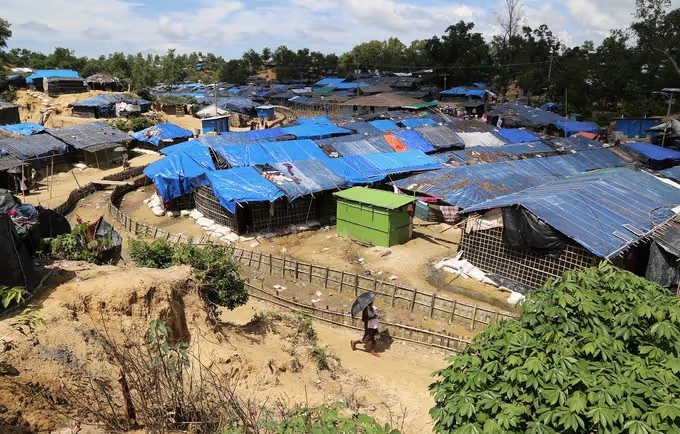Five years on: investigating the needs of Rohingya refugees through five research studies

This August marks five years since the Rohingya crisis began. In that time, hundreds of thousands of Rohingya people have fled Myanmar, seeking refuge in Bangladesh and elsewhere in the world. The UN has called the Rohingya crisis “the world’s fastest-growing refugee emergency.”
To mark this moment, we are sharing five research studies we are funding to investigate the needs of displaced populations in refugee settings. These studies cover a range of issues in humanitarian crisis contexts including mental and psychosocial support (MHPSS), handwashing and sexual and reproductive health.
Caring for carers: a psychosocial supervision intervention for mental health practitioners
Lead organisation: University of New South Wales
Partners: Hope Revival Organisation; Koҫ University; Dhaka University; MHPSS working group Cox’s Bazaar Suicide Prevention Sub-group
The project aims to determine the impact of a psychosocial supervision intervention for mental health professionals to improve the quality and sustainability of mental health and psychosocial services in humanitarian contexts. The mixed-methods approach of this study will provide quantitative evidence of the effectiveness, while rich qualitative data will enable us to identify how factors such as the displaced population (Syrian/Rohingya), setting (camp/urban), displaced or host community practitioners, and whether language and culture is shared by practitioners and patients, impact on intervention implementation. This will support the scale-up of the intervention to diverse settings and identify potential facilitators and barriers to implementation.
Early marriage and fertility decision-making among conflict-affected and displaced adolescents in Bangladesh and Yemen
Lead organisation: Johns Hopkins Bloomberg School of Public Health
Partners: BRAC — JP Grant School of Public Health; Community Partners International (CPI); Building Foundation for Development; Sana’a University
The study aims to understand how conflict and displacement affect patterns of early marriage, demand for childbearing and fears of sub-fecundity (waiting months, or years, to achieve pregnancy) and how these in turn affect desire for and use of reproductive health services.
It is building on previous studies in Bangladesh and Yemen to enable some longitudinal comparisons. It is building the evidence base for designing services that respond to the needs of the adolescents in conflict-affected communities and provide insight into the effect of COVID-19 on adolescent sexual and reproductive health.
Psychological ownership and handwashing-device functionality during the COVID-19 crisis
Lead organisation: Eawag Swiss Federal Institute of Aquatic Science and Technology
Partners: International Federation of Red Cross and Red Crescent Societies (IFRC), Ranas Ltd.
This research investigated the role of individual and collective psychological ownership on monitoring and maintenance of public and private handwashing devices using a controlled trial, under the current COVID-19 crisis in the context of the Rohingya refugee camp Bangladesh.
Human and environmental health costs and benefits of firewood versus clean fossil fuel use by forcibly displaced Myanmar nationals and host communities in Bangladesh
Lead organisation: Stanford University
Partners: International Centre for Diarrhoeal Disease Research, Bangladesh (icddr,b); International Organization for Migration (IOM); United Nations High Commission for Refugees (UNHCR); and the Energy and Environment Technical Working Group in Cox’s Bazar
The study focuses on investigating the human well-being and environmental impacts of the distribution of liquid propane gas (LPG) to replace firewood for cooking in Rohingya refugee camps.
The study is exploring multiple factors including use of time, security, household economics and indoor air pollution, which have particularly negative impacts on women and children. It is also investigating the cost-effectiveness of the fuel intervention and how the effectiveness of LPG distribution and uptake could be increased.
Supporting reproductive autonomy in refugee settings through ARCHES intervention
Lead organisation: Ipas
Partners: Center on Gender Equity and Health at the University of California, San Diego, International Organization for Migration, International Rescue Committee, Multisectoral Programme on Violence against Women
Ipas is looking to adapt the Addressing Reproductive Coercion in Healthcare Settings (ARCHES) intervention to serve women and girls in Rohingya refugee camps. ARCHES is an evidence-based intervention that provides support and offers women and girls strategies to regain their reproductive autonomy.
Adapting ARCHES for this setting will support the humanitarian community in improving provision of sexual and reproductive health care and strengthen linkages with community based IPV services, which are greatly needed.
Stay updated
Sign up for our newsletter to receive regular updates on resources, news, and insights like this. Don’t miss out on important information that can help you stay informed and engaged.
Explore Elrha
Learn more about our mission, the organisations we support, and the resources we provide to drive research and innovation in humanitarian response.